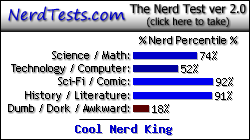In the face of all the rotten stuff in the world, a friend commented yesterday that a lot dieties must be falling down on the job. I responded in a comment to the photo that led to the comment and realized I had the makings of an essay:
I believe in a Diety. But not one who's intimately involved in our daily lives as an actor. Philospohers and theologians call it Theodicy - the question of how a god who is good can permit evil in the world.
+Rabbi Harold Kushner, whose son died of progeria, wrote a book about When Bad Things Happen to Good People that addressed the problem this way: We're taught that G-d is Omnipotent, Omniscient, and Omnibenevolent. At the micro level (the death of his innocent son) and at the macro level (the Holocaust), these three attributes seem irreconcilable. He chooses to discard Omnipotence.
I'm oversimplifying here, but Kushner teaches that G-d weeps with us over the suffering of innocents, but that it's the price of G-d's creating a universe where intelligent beings are free to make moral choices. If we spent less on armaments (and ornate houses of worship) and more on fighting horrible diseases, fewer people would die of warfare AND of horrible deseases.
+Gordon Liddy, who is a remarkably good explainer of orthodox Catholic thought, and a hilarious radio talk-meister if you can stomach his love of ABBA, often calls G-d "The Uncaused First Cause" - a concept he learned as part of a good Jesuit education. G-d created our whole universe out of nothingness, a sure sign that G-d's not restricted by any power in that universe.
It winds up being a pretty close fit with Rabbi Kushner's formulation. Liddy's G-d chooses to restrict His own Omnipotence, where - I think - Kushner sees it as required by the logic of Creation, rather than by a conscious choice by an otherwise omnipotent diety, but they wind up in the same place, as a practical matter.
+I just finished reading Walter Isaacson's biography of Einstein. According to Isaacson, Einstein definitely did not believe in a personal, all-knowing, all-seeing parent figure of a god who rewarded good and punished evil. But he saw G-d in the fundamental laws of a reality that he spent a lifetime trying to describe with thought experiments and mathematical equations.
In the second half of his life, after he'd made the break-throughs which established the General Theory of Relativity and its cousin, the Special Theory of Relativity, he spent his time tring to refute the growing acceptance of quantum theory, because it encompassed Heisenberg's Uncertainty Principle, demanded paradoxes that defied causality, and left poor Schroedinger's cat-in-a-box in a perpetual state of neither death nor life, unless someone opened the box.
G-d does not play dice with the universe, he proclaimed.
+All of this informs my view and leads me to believe that no diety or dieties are falling down on the job. I don't see G-d in Hurricaine Sandy. I think the insurance company language that calls a hurricaine an "Act of God" is nearly blasphemous.
Where I see G-d is in the inspiration that leads first responders into harms way to help Sandy's victims. And in the outpouring of support neighbors bestow upon neighbors in a storm's aftermath.
And I don't see G-d in the ovens at Aushwitz. I see him in the inspiration that led Jehovah's witnesses - also in the camps, but treated slightly less harshly - divvying up their rations, risking the ire of the Nazis and their own nutritional well-being, in order to try to keep Jews from starving until the deliverence they prayed for arrived. .
Friday, December 7, 2012
Subscribe to:
Post Comments (Atom)



2 comments:
Good post....
This is something that I have never understood. God gave humans free will. But God is omniscient, so He already knows what we will do. So then what's the point of creation? If I were God, I'd be bored.
Post a Comment